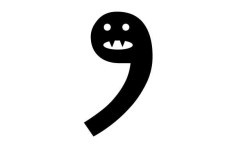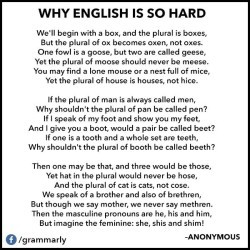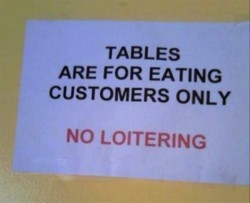Arlene Miller's Blog, page 53
January 27, 2016
Selekted Riting Wrules
Okay — so we don’t always have to be serious. It’s about time I found a good use for some of the internet jokes that appear on the e-mail in box.
1. Verbs HAS to agree with their subjects.
2. Prepositions are not words to end sentences with.
3. And don’t start a sentence with a conjunction.
4. It is wrong to ever split an infinitive.
5. Avoid cliches like the plague. (They’re old hat)
6. Also, always avoid annoying alliteration.
7. Be more or less specific.
8. Parenthetical remarks (however relevant) are (usually) unnecessary.
9. Also too, never, ever use repetitive redundancies.
10. No sentence fragments.
11. Contractions aren’t necessary and shouldn’t be used.
12. Foreign words and phrases are not apropos.
13. Do not be redundant; do not use more words than necessary; it’s highly superfluous.
14. One should NEVER generalize.
15. Comparisons are as bad as cliches.
16. Eschew ampersands & abbreviations, etc.
17. One-word sentences? Eliminate.
18. Analogies in writing are like feathers on a snake.
19. The passive voice is to be ignored.
20. Eliminate commas, that are, not necessary. Parenthetical words however should be enclosed in commas.
21. Never use a big word when a diminutive one would suffice.
22. Use words correctly, irregardless of how others use them.
23. Understatement is always the absolute best way to put forth earth-shaking ideas.
24. Eliminate quotations. As Ralph Waldo Emerson said, “I hate quotations. Tell me what you know.”
25. If you’ve heard it once, you’ve heard it a thousand times:
Resist hyperbole; not one writer in a million can use it correctly.
26. Puns are for children, not groan readers.
27. Go around the barn at high noon to avoid colloquialisms.
28. Even IF a mixed metaphor sings, it should be derailed.
29. Who needs rhetorical questions?
30. Exaggeration is a billion times worse than understatement.
And the last one…
31. Proofread carefully to see if you any words out.
January 21, 2016
The Comma Quiz: Now That You Know All About Commas!
 The Comma Quiz
The Comma QuizFor the last few months, commas have been the main topic on this blog. We all have trouble with commas, which have about 962 rules! Well, it is time for the quiz, but don’t worry. No one but YOU is going to correct it. And it won’t be very difficult. Think of it as one of those Facebook quizzes we all love!
Here are the rules: Add commas where they belong in the following sentences. Sometimes punctuation will be missing, but it won’t be a comma, so be careful. For example:
How are you doing
It’s not a comma, but a question mark, so you don’t need to do anything. Just add commas where they are needed. Some of the sentences may be correct as they are, but I am not telling! When you are finished, scroll down for the answers. Here we go . . .
Clean your room right away Cassie!
I need to look at the May 12, 1960 issue of Time magazine.
My neighbor across the street is away for three months.
Dear President Obama (beginning of a letter to the President)
The book that is on the coffee table is full of beautiful photos of wildflowers.
“The weather is rainy today” she said, “and it will be rainy again tomorrow.”
By the way Joe, we are out of coffee.
In California it doesn’t generally snow.
I was born in Little Rock, Arkansas but later moved to Kentucky.
I went to the movies then came home and watched television for seven hours.
She told me she was coming to visit but never showed up.
We are going to France, Italy, Spain and Portugal.
While we were eating mosquitos kept biting us.
I can’t go with you because I have to be at the game.
She was small but could take good care of herself.
I went to Harvard and graduated in 1980.
Her address is 10 Montrose St. Lynwood, New Jersey 23456
Although it is raining we are going to the football game.
I agree with you completely in your opposition to the new rules.
Wherever he is going I will follow him.
Now scroll down of the answers:
keep going . . .
keep going . . .
keep going . . .
a little more . . .
just a little more . . .
keep going . . .
okay, one more time . . .
Answers:
Clean your room right away, Cassie! (comma before Cassie; direct address)
I need to look at the May 12, 1960, issue of Time magazine. (comma after the year — even here)
My neighbor across the street is away for three months. (okay as is. You probably need across the street)
Dear President Obama: (beginning of a letter to the President) (no comma; it should be a colon)
The book that is on the coffee table is full of beautiful photos of wildflowers. (okay as is; you need the clause)
“The weather is rainy today,” she said, “and it will be rainy again tomorrow.” (comma after today)
By the way, Joe, we are out of coffee. (add another comma after by the way phrase.)
In California it doesn’t generally snow. (okay as is; acceptable to put a comma after California, but not needed)
I was born in Little Rock, Arkansas, but later moved to Kentucky. (comma after Arkansas)
I went to the movies then came home and watched television for seven hours. (NO COMMA. You need a semicolon or a period after movies, unless you added a conjunction like and; then you can use a comma)
She told me she was coming to visit, but never showed up. (opposing statements; comma after visit)
We are going to France, Italy, Spain and Portugal. (okay as is; you can add Oxford comma after Spain.)
While we were eating, mosquitos kept biting us. (comma after eating for clarity)
I can’t go with you because I have to be at the game. (okay as is; no comma before because.)
She was small, but could take good care of herself. (comma after small; opposing statements)
I went to Harvard and graduated in 1980. (correct as is; no comma; not a compound sentence)
Her address is 10 Montrose St., Lynwood, New Jersey 23456 (comma after St.)
Although it is raining, we are going to the football game. (comma after rain; introductory clause)
I agree with you, completely, in your opposition to the new rules. (optional commas around completely for emphasis, but not necessary)
Wherever he is going, I will follow him. (comma to clarify unusual word order)
Aw, I think that was too easy! Anyway . . .
If you want something to do in the rain, come on down to Gaia’s Garden on Mendocino Avenue in Santa Rosa from two to four Saturday afternoon (January 23) for Redwood Writers Open Mic. I will be a featured speaker, along with Abby Bogomolny. I will be reading from Fifty Shades of Grammar.
If you haven’t done so yet, please check out my new website!
January 19, 2016
Grammar Is 50 Shades of Gray After All!
Here is an interesting article from Science Magazine. Check it out: http://www.sciencemag.org/news/2016/01/grammar-rules-aren-t-nearly-clear-cut-we-thought
And here is another great article about some common malapropisms!
January 18, 2016
English – Such a Weird Language!
January 17, 2016
What? Leave Only the Punctuation?
Wow! Here is an interesting idea! All the words were taken out of famous literature, leaving only the punctuation – and then someone wrote a book about it! Could be interesting! Click here to find out more.
January 16, 2016
Interesting Article: The Phrase “Thanks to . . .”
Interesting: Thanks to you….
January 14, 2016
Commas Part 10: Comma Finale!
Commas Make All the Difference!
We have been talking about the pesky comma for nine previous blog posts! This post will give the remaining significant comma uses. Here we go:
Use a comma in phrases and sentences containing a contrast or two opposing ideas:
He was small, but very strong
Here today, gone tomorrow
Garbage in, garbage out
I might go the movies, but not out to dinner afterwards.
She has dark hair, not blonde hair, as we had thought.
The more the merrier (No comma is needed in very short phrases)
2. Use a comma to separate two identical words in a row (or rewrite the sentence):
Where he is, is the question.
Wherever she goes, goes her dog.
Let them come in, in single file.
Whatever will be, will be good!
3. Use a comma in quotations, often instead of a period.
“He lives next door,” she said.
She said, “He lives next door.”
“He lives next door,” she said, “but he isn’t home right now.”
“He lives next door,” she said. She added, “He isn’t home right now, though.” (The comma before though is the comma’s use as sort of an afterthought. Here are other examples: He isn’t here, however. Set the table, please.)
4. Use a comma for a question that is part of a sentence when it is at the end:
I asked myself, I wonder where she went. BUT
I wonder where she went? I asked myself. (Italics are often used for the thoughts of the speaker).
5. Use commas in the greetings of friendly letters and closings of letters, memos, and e-mails:
Dear Susie, (For business letters use a colon instead of a comma)
Yours truly, With regards,
Frank Jones Dr. Lester
6. Use commas in sentences with an unusual word order:
Where he is, I certainly don’t know. (Would generally be I certainly don’t know where he is.)
What I will do next, I don’t know. (Would generally be I don’t know what I will do next.)
7. You can use commas sometimes for emphasis:
They think, unrealistically, that they can beat the other team.
I believe, completely, that you will get into that college.
8. Commas can be confusing when used with other punctuation. To review (these are American English standards):
No matter what, commas always go inside quotation marks and exclamation points.
Occasionally, you will have cause to use a period and a comma in a row, but not usually: For example – She lives at 110 Main St., Worcester, MA. However, it is always best to spell things out in text, so you would probably write Street instead of St., so there would be no period anyway.
These final two comma reminders may seem to conflict!
9. Don’t use commas without a reason. Commas are not like salt and pepper — to be sprinkled willy-nilly over your writing. HOWEVER…
10. Use a comma wherever in your writing not using one would cause confusion. Here are some examples of such cases: The dress comes in black and white, and blue and white. While eating, ants invaded our blanket. To Ellen, Mary was a pest. I saw the spider who ran up the wall, and screamed.
There you have it! In the ten posts about comma use, you have most of the ways we use commas. Some of the standards we discussed can be broken down even further into smaller categories. And although it is not foolproof by any means, the old trick of using a comma when you pause does work sometimes, even much of the time… but not always. Some people love commas and use them whenever they can (appropriately); others find them a nuisance in reading and writing. It is probably best to err on the side of too few commas as long as the meaning is clear. Clarity is the reason for punctuation.
Stick around, and next week find out when you shouldn’t use commas.
NEWS:
My website is undergoing a facelift in the next several days, but it will still be up for your viewing pleasure. Look for some new and interesting features to come.
I will be one of the featured readers at the Redwood Writers Open Mic on Saturday, January 23 from 2 to 4 p.m. at Gaia’s Garden on Mendocino (I think) in Santa Rosa, CA.
Mark your calendars on Friday, February 26 at 7 p.m. I will have the official launch (of course, there will be cake; there is always cake) of Fifty Shades of Grammar at the Petaluma Copperfields Books on Kentucky Street.
I am delighted and very proud of a review I just received on Amazon for The Best Little Grammar Book Ever, so if I can indulge myself and brag, here it is:
“In preparation for a remedial community college English class I taught, I purchased 6 other grammar books to compare against one another (e.g., The Idiots Guide, Dummies, CliffNotes, etc). Hands down, The Best Little Grammar Book Ever! is the BEST. I even brought the other books to my class to show the students and they all voted for Ms. Miller’s. Her examples are clearly presented, examples precise, and formatting accessible. She includes quizzes at the beginning of every chapter and the answers are on the next page. The students are able to see where they need help before getting stated. She does go a little overboard with her use of exclamation points, but she also lets the readers know this. It does reflect her passion for grammar. My students and I thank her for making the learning process less painful.”
January 8, 2016
Commas Part 9: Yet More Comma Uses!
 The Chicago Manual of Style has 59 comma rules; one of my favorite old reference books, the Gregg Reference Manual, has 52. I promise you we won’t be discussing that many because I have grouped some together and left some more minor ones out (you can rely on the “pause” method for those!)
The Chicago Manual of Style has 59 comma rules; one of my favorite old reference books, the Gregg Reference Manual, has 52. I promise you we won’t be discussing that many because I have grouped some together and left some more minor ones out (you can rely on the “pause” method for those!)
We have talked about these comma usages so far:
The comma in a series (Oxford)
Commas in compound sentences
Commas with interrupting words
Commas with introductory words and phrases
Commas with interrupting phrases
Commas with adjective clauses
Commas with adverb and noun clauses
This post talks about six other comma uses.
Direct Address: Direct address is when you call someone by name. And when you do, in a sentence, you set the name off with commas regardless of where in the sentence the name appears.
Megan, please do the dishes.
Please, Megan, do the dishes.
Please do the dishes, Megan
Two Adjectives in a Row: Sometimes two adjectives in a row are separated with a comma, but sometimes they are not. If the first adjective describes the second adjective (rather than the noun that follows them), there is no comma:
I like the bright blue dress. (bright describes the kind of blue, not the dress)
There is, however, sometimes a fine line as to whether there should be a comma between the adjectives. The best thing to do is read the phrase and put “and” between the two adjectives. If the phrase sounds okay with “and,” you should probably use a comma between the two adjectives (but take out the and!)
Do you have to wear that old green shirt? (old and green doesn’t really sound right, so no comma needed)
That old, raggedy sweater is mine. (old and raggedy sounds okay, so use a comma)
Did you see the great new show at the theater? (great and new doesn’t sound right, so no comma)
I rescued that old, sad dog from the shelter. (old and sad sounds okay; I would say this one goes either way)
Usually, it doesn’t make a whole lot of difference if you leave the comma out. If you put the comma in where it doesn’t belong (like bright blue dress), it will look strange.
Certain Words and Abbreviations: We pretty much covered this with interrupting words. Things like namely, for example, i.e., e.g., and that is are set off with commas.
I love Italian food, namely, pizza, pasta, and garlic bread.
She likes active hobbies, for example, sports and dancing.
She is the drum major in the band, that is, the leader of the marching band.
I want to go to an ivy league school, e.g., Harvard, Yale, or Princeton
Dates: A common use of commas is in dates, and it can be confusing and best shown by example.
January 9, 2016 (in a letter)
9th of January, 2016 (in a letter)
On January 9, 2016, we will have a meeting.
I need the January 9, 2016, issue of the magazine.
I was born on January 9, 1999, in New York City.
I was born in January 2016 in New York City.
Addresses: Addresses can also be kind of confusing and are best shown by example. An address on an envelope is pretty straightforward, so other examples will be for addresses in text. Envelope:
Mr. James Johnson
49 Baker Street
Boston, MA 12345
Send the package to Mr. James Johnson, 49 Baker Street, Boston, MA 12345.
Send the package to Mr. James Johnson, 49 Baker St., Boston, MA 12345
Send the package to Mr. James Johnson, 49 Baker Street in Boston.
I am moving to New Orleans, Louisiana, in a year or two.
I was born in Los Angeles, California, in 1968.
I was born in California in 1968.
Title and Company Names: The best rule of thumb to follow here is to write the company name or person’s title the way they want it done. I am talking mostly about things like Jr. and Inc., here. You do not need commas.
Mark J. Phelan, Jr. is speaking tonight
Mark J. Phelan Jr. is speaking tonight.
You don’t put a comma after Jr. And it is up to the person as to whether they spell it with a comma before Jr.. If you don’t know….either way is OK.
Athens Chemical, Inc. is building a new complex downtown.
Athens Chemical Inc. is building a new complex downtown.
Spell and punctuate a company’s name just the way they do.
Next week: The final comma rules (Yay!)
P.S. I probably already mentioned this in a previous post, but you do not need a comma before the too at the end of a sentence:
I, too, would like to go.
I would like to go too.
NEWS:
I will be reading from Fifty Shades of Grammar as the Featured Speaker at Redwood Writers Open Mic at Gaia’s Garden in Santa Rosa, Saturday, January 23 from 2-4 p.m. Please come hear me and other local authors!
The launch event for Fifty Shades of Grammar is set for Copperfields Books in Petaluma on Friday, February 26 at 7 p.m. Please help me fill those seats! And hear some fun posts from the book!
If you have any of my books, I would so appreciate an Amazon review. Thank you!
My website will be new, improved, and more mobile friendly in a couple of weeks. Same address!





